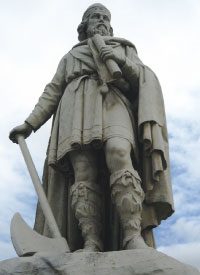
It is a fact beyond dispute that America’s greatness is rooted deeply in the history of England, most particularly with regard to such things as culture, language, law, the concepts of liberty and free speech, and the rights, as well as duties, of individual men and women. Those things began their development in the Anglo-Saxon Christian kingdoms of old England and evolved slowly over the centuries until, in our own God-preserved land, they flowered. Let us travel back in time, to a period so remote from us that it is only seen dimly, a small light, as it were, on a far distant horizon. Here we discover a source for many of the good things that derive from our English ancestors: That source is King Alfred the Great.
Alfred was King of the southernmost of the several kingdoms in ninth-century Anglo-Saxon England, Wessex. One of the true giants of English political history and also of the early English church, Alfred is the only English monarch upon whom history has bestowed the title “Great.” John Henry Overton, author of a two-volume history of the English church, writes of Alfred that he “was the greatest and best King that ever reigned in England,” and this is so, in part, because “his unique character was formed on a distinctly Christian basis.”
Young Alfred
Alfred was born in 849 A.D., in the village of Wantage (now in the county of Oxfordshire), the fifth son of King Ethelwulf and his Queen, Osburga. Alfred’s love of God and his eagerness for the acquisition of knowledge and wisdom were noted early in his life. The story is told of a contest, arranged by Alfred’s mother, in which she promised a valuable book of Anglo-Saxon poetry to the first of her sons who could memorize and recite all of the poems in the book. Although he would only have been a small child at the time, the youngest of the sons, Alfred nevertheless succeeded in memorizing the book first, and was awarded it by a doubtless proud mother. As fifth in line of succession, it seemed unlikely when he was young that he would ever become King, and for that reason he often spoke to his parents of taking monastic vows. That, however, was not to be.
In the ninth century, Christian England was engaged in a protracted war for its very survival, fending off continual attacks by the pagan Danes, who, wherever they went, cut a swath of devastation across the land, leaving behind plundered and burnt farms, towns, villages, churches, monasteries, and libraries. Christianity, then as now, was concomitant with learning and culture, while paganism in its primitive Viking form despised such things and, consequently, sought their destruction. For examples we need only consider the monastery on the island of Lindisfarne and the twin monasteries at Wearmouth and Jarrow. Those monasteries were beacons of learning in Anglo-Saxon England, and sadly, all were destroyed in Viking raids, the sacred vessels and other valuables seized, the libraries filled with priceless manuscripts set ablaze, and the monks murdered.
Moreover, while the earlier raids were bent on plunder and savagery, in 865 A.D. the Danes embarked on a full-scale invasion, seeking to supplant Anglo-Saxon-Christian civilization and its kingdoms with pagan rule. In succession, each of the northern kingdoms fell to the Danes: First Northumbria succumbed; next East Anglia was overrun; and, shortly thereafter, Mercia fell. The Great Heathen Army, as it was called, appeared unstoppable, like a plague of locusts, leaving utter ruin in its wake.
Three of Alfred’s brothers, Ethelstan, Ethelbald, and Ethelbert, had died by 865, the last two of the three reigning successively as Kings. Ethelbert was succeeded by Ethelred, who, with the young Prince Alfred at his side, fought several battles with the Danes as they moved relentlessly southward. The first such battle, at Reading, was a defeat, but the second, at Ashdown, a victory. King Ethelred was again defeated at Basing, and at his final battle, in April 871 at Merton, was killed. Upon his death, Alfred, at age 22, succeeded his brother as King.
Strife and Struggle
It happens that about the time of Alfred’s accession to the throne, the Danes ceased their attacks, perhaps to consolidate their conquests and gather strength for the final assault on Wessex. In 875, however, the attack was renewed, the King successfully holding the enemy at bay. Similar attacks were launched in 876 and 877, each one beaten back. In 878, however, the Danish chieftain Gunthrum organized a much larger invasion, this time nearly overthrowing Wessex and its King. This was the dark time for Alfred, when he was forced to withdraw to the island fortress of Athelney and when a pagan triumph seemed inevitable. Yet, his faith was undiminished.
It is often the case that bodies of legend grow up around famed historical figures. One can find examples of that throughout history, from stories about Alexander the Great to those about our own George Washington. Legends are stories passed down by tradition and, although they may be historically true, their historicity is no longer verifiable. The purpose of legends, most frequently, is to inspire the reader by emphasizing some aspect of a particular historical figure’s character, such things as piety, honesty, courage, brilliance, prowess in battle, and so forth, or to show that the subject of the legend was in some way favored by God. One such legend about Alfred is retold by historian Paul Hill in his book The Viking Wars of Alfred the Great.
Hill writes that at the time the King had retreated to Athelney, and when the future looked so bleak, “a mysterious pilgrim somehow entered the fortification while most of its defenders were on a hunting trip and approached the king, begging for alms. Alfred broke into his supplies of wine and bread and shared them with the strange traveller.… The pilgrim took his leave and, strange to say, left behind no hint of a footprint. Alfred returned to his stores, having shared the most precious of supplies in a difficult time, to find the stocks mysteriously replenished. The hunters soon returned with a colossal catch of fish and later that night, as he slept, a vision of a man dressed in bishop’s robes appeared before the king and told him that the next day helpers would arrive to aid him in his struggle with his enemies. When questioned by Alfred, the apparition identified himself as none other than St. Cuthbert,” the renowned sixth-century Bishop of Lindisfarne and Patron of Northumbria.
As foretold by his vision, or dream, King Alfred regained the initiative at the Battle of Ethandun (modern Edington, in Wiltshire) in May 878, where he defeated Gunthrum decisively and forced the Danes to the peace table. As part of their treaty, Gunthrum agreed to accept Christian baptism, with Alfred as his godfather, and further agreed to recognize a boundary between the Anglo-Saxons and the Danes. Those among the Danes who accepted baptism were allowed to settle in England; those who refused were required to leave. The treaty established peace between the two peoples for 15 years, after which time the Danes again attempted to overwhelm the Anglo-Saxons. This time, thanks to Alfred’s unremitting efforts at building powerful defenses, Danish military strength was finally broken, the Christian Anglo-Saxons achieving supremacy in England.
During the war, and even after the defeat of the Danes, Alfred, recognizing that seaborne attacks posed an especially serious threat to his realm, greatly expanded his navy, introducing swift-moving long ships that could outdistance enemy craft and thus protect the coast. He is therefore traditionally acclaimed as the founder of the Royal Navy. He is considered as well the founder of the traditions of the U.S. Navy, since those traditions are derived from England. The first flagship in the Continental Navy during the American War for Independence, commanded by John Paul Jones, was named the Alfred, in honor of the great King.
War Against Ignorance
The 19th-century historian Johann Heinrich Kurtz writes of Alfred that he, “equally great in peace and war, distinguished as a general, a statesman, and a legislator, and renowned as a poet and prose writer, raised the literature of his country to a height never before attained.” A modern historian, Jeffrey Burton Russell, writes similarly when he states, “Alfred the Great developed his own intellectual court; one of the few early medieval monarchs who could read, he himself translated from Latin into English the Dialogues of Gregory the Great, the Consolation of Philosophy by Boethius, and other works.”
Wishing to elevate his people morally and culturally, and realizing that to accomplish that goal books must be produced in a language his people could understand, Alfred himself translated a number of works from Latin into the Anglo-Saxon tongue (also called “Old English,” the foundation of modern English). Among these works, in addition to those mentioned by Professor Russell, are St. Gregory the Great’s Book of Pastoral Care, which was translated, with copies made for distribution to every bishop in the realm, and a portion of the Psalms. The King also translated, or commissioned translations of, the Universal History of Orosius, Aesop’s Fables, and the Venerable Bede’s Ecclesiastical History of the English People. An anthology from St. Augustine’s Soliloquies combined with excerpts from other religious and classical works, compiled and translated by the King and known as Blooms, or Blossoms, ends with a characteristic passage written by him: “Therefore he seems to me a very foolish man, and very wretched, who will not increase his understanding while he is in the world, and ever wish and long to reach that endless life, where all shall be made clear.”
Finally, the great man is credited with having commissioned the writing of the Anglo-Saxon Chronicles, a primary source for our knowledge of Anglo-Saxon England, and an Anglo-Saxon Martyrology. Without question, Alfred’s efforts at elevating his people and, at the same time, in fashioning English into a language worthy of great literature, both sacred and secular, were crowned with success.
Master of Morals
Along with all of the foregoing, Alfred enhanced these moral and educational efforts by encouraging scholars from abroad to immigrate to his kingdom. Among these were a Welshman, Asser, who became Bishop of Sherborne and who wrote; Grimbald from France, a man of vast learning who became Abbot of Winchester; and John the Old Saxon, a German, who became Abbot of Athelney. Another scholar, Plegmund, a Mercian, became Archbishop of Canterbury, while the brilliant Waerferth, also a Mercian, was appointed Bishop of Worchester. Paul Hill writes, “Alfred bemoaned the fact that there was such widespread illiteracy in his kingdom. He had complained that it had not always been the case and like any good Anglo-Saxon, spoke of a previous Golden Age, when things had been so much better.” Understanding that literacy was essential to good government, the King established a school at his court for the sons of his nobles. Because of his intense interest in advancing education in his kingdom, Alfred is often credited with the founding of Oxford University. While that distinction is disputed by modern scholars, what is certain is that, even if he was not directly responsible for the university’s founding, his efforts in creating institutions of learning in England led to the founding of Oxford University.
Throughout Alfred’s life, especially during the years that he gained some res-pite from warfare, he devoted much of his time to religious affairs, giving generous donations to rebuilding monasteries ravaged by the Danes and to founding new monasteries and churches. Alfred showed ongoing favor to religion. The royal income was split into two parts, the first half of which was spent on secular affairs. I quote once again from Paul Hill’s book: “The second half of the treasury’s income was earmarked for God. The king’s thegns were told to divide this half into four parts, the first of which would support the poor and needy of any race who came to him. The second portion would go to support the [religious] communities at Shaftesbury and Athelney, which had been set up by the king, while the third part would support the school, which had begun to bring so much learning to those who would surely need it. The fourth portion was divided among the religious houses across the new kingdom. The funds must have been more than adequate since … Alfred was able to provide financial support for houses in Wales, Gaul, Brittany, Northumbria and even in Ireland.”
Insofar as personal piety is concerned, author Frederic Harrison writes that Alfred “attended … daily religious services: he was frequent in singing psalms and in prayer, at the day hours and the night hours; he went to the churches at night to pray secretly, unknown to his courtiers. He was in the habit of hearing the Divine Scriptures read by his own countrymen, or, if it so happened, in the company of foreigners. His bishops, too, and all ecclesiastics, his earls and nobles, his officers and friends, were loved by him with wonderful affection.”
King Alfred was a great lawgiver, recasting and codifying the laws of his kingdom, much in the manner of Justinian the Great who revised and codified Roman Law. Alfred blended elements from existing Anglo-Saxon law with portions from Old Testament law (the Decalogue, most particularly) and the best of the laws of neighboring kingdoms. He regarded himself as the father of his people and insisted on justice for all of his subjects, rich and poor. Hence, he was known quite rightfully as the “Protector of the Poor.” In this regard, Bishop Asser of Sherborne, the King’s biographer, writes: “He was a careful searcher out of truth in judgments, and the more so owing to his care for the poor. On their behalf, amid all the other duties of this present life, he was wonderfully solicitous day and night.”
Alfred was an absolute monarch only in theory. In practice, major changes in administrative, judicial, or legal matters were submitted to the Witenagemot, or, in today’s English, the “Assembly of the Wise,” sitting from time to time and made up of the nobility, certain government officials, and higher clergy, to whom the King submitted his proposals and to whom he listened for counsel. While this was not a legislative body in the modern sense, nonetheless a prudent ruler made no final decisions without paying heed to the verdicts of the Assembly. Furthermore, the monarch in Anglo-Saxon times was not considered above the law, but was subject to it, as were all men and women.
Alfred, though a King, was nevertheless a humble man. He was highly intelligent and well read, yet he often disparaged his knowledge and his scholarly abilities. Harrison says of him that “he complained to God, and to all who were admitted to intimacy with him, that the Almighty had made him ignorant of divine wisdom and of the liberal arts.”
There is another famous legend that illustrates his unpresuming character, from the period when the fortunes of war had momentarily turned against him. For several days, he took shelter in the cottage of a swineherd, where he was treated hospitably. Writer Dr. Vladimir Moss tells the story: “Now one day the swineherd had gone to look after his flock, and Alfred remained in the hut with the swineherd’s wife. She put some kneaded flour in the oven, and then occupied herself with other domestic chores. Suddenly, she noticed from the other side of the room that the bread was burning, and angrily said to the king (unknown to her as such): ‘You hesitate to turn the loaves which you see to be burning, yet you’re quite happy to eat them when they come warm from the oven!’ The king humbly submitted to the woman’s reproaches, and set about turning the bread.”
Historian of early Christian England D.J.V. Fisher writes: “What distinguishes King Alfred from any other Anglo-Saxon king was the combination in him of outstanding military ability with an originality of mind and breadth of outlook which gave a new dimension to English kingship. His conception of royal authority, adopted and developed by his successors in easier political circumstances, made acceptable to all their subjects the expansion of the ‘tribal’ kingdom of Wessex into the territorial kingdom of England. In this lies Alfred’s title to greatness.”
At Wantage, the birthplace of Alfred, a statue of the great Anglo-Saxon King was erected and unveiled in 1877. The inscription at the base of the statue beautifully summarizes his reign:
Alfred found learning dead and he restored it, education neglected and he revived it, the laws powerless and he gave them force, the church debased and he raised it, the land ravaged by a fearful enemy from which he delivered it. Alfred’s name shall live as long as mankind shall respect the past.



